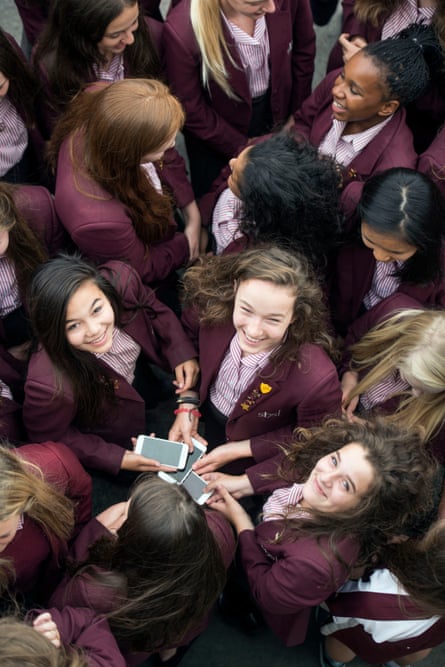Fourteen-year-old friends Hannah Cox and Libby Shirnia admitted they were a little taken aback when their school announced stringent new rules on mobile phones, smart watches and Fitbit activity monitors.
“Everyone’s reaction was: ‘This is so annoying.’” said Libby. “But then we chatted about it and thought it might be a good thing. It’s the worst thing when you’re having a conversation and someone is doing that [Libby mimes tapping and sliding on a smart screen].

Hannah said it did get confusing when you tried to keep multiple conversations going on two or three different media platforms. “Maybe you should just talk to your friends in real life – shocking, I know.”
Libby and Hannah’s school, Stroud high in Gloucestershire, hit the headlines this week after it emerged that it was clamping down on mobile devices. What grabbed the attention was the idea that the move was partly because of concerns that some girls were becoming obsessed with counting steps and calories – and skipping meals to make sure they met their targets.
But the drive is not just about that. The school, an academy primarily for girls, is concerned that mobile devices are leading to addiction to social media – as well as counting steps.
When pupils return from their summer break, girls in years seven to nine will be banned from using their devices at all during the school day. Those in years 10 and 11 will be allowed to use their devices at lunch, while pupils in the sixth form – which includes boys – will be allowed to use them freely except in lessons.
Stroud high school is fast becoming something of a pioneer in its determination to address problems caused by mobile devices. Hannah and Libby were among a group of girls who penned a letter addressed to the “boys and young men of Gloucestershire, Great Britain and the world” explaining why they did not want to be pressured to send explicit pictures and did not want to receive such images.
The school has also started to work with local primary schools, mental health services and local government to draw up programmes and strategies aimed at tackling problems caused by social media.
“Girls are constantly comparing themselves to each other,” said deputy headteacher Cindi Pride. “‘She has got longer hair, blonder hair, better clothes, better holidays.’ People only ever post the golden parts of their lives. That constant comparison is hugely detrimental.”

Earlier this year the school ran a survey in which almost three-quarters of students said they check or respond to social media “constantly”. More than half were taking their phones to bed. But the statistic that alarmed Pride was that more than half of key stage three pupils (aged 11-14) said they would like to feel more in control of their use of social media.
“If that wasn’t a cri de coeur, I don’t know what was. They want more control, they patently don’t know how to do it, or they would be doing it. We need to try to help them. School is a place where you should be able to learn, have fun, have authentic friendships, not be talking to each other across the room via Snapchat.”
The findings tally with a string of academic studies. The Office for National Statistics found, for example, that 12% of children who spend no time on social networking sites on a normal school day have symptoms of mental ill health; the figure rises to 27% for those who are on the sites for three or more hours a day.
Around 400 pupils and adults at Stroud high school took part in a week-long “digital detox” when they gave up their devices and at home. Benefits the girls reported included having more free time and feeling less stressed.
Pride said the focus on Fitbits had been blown out of proportion. But she said: “I personally don’t think that fit and healthy young women in an environment like this need to be counting every step. The number of Fitbits and smart watches on young women with perfectly normal body shapes is quite alarming. I don’t know why people have this obsession monitoring every breath they’re taking.”

Jess Hourston, 16, is one of those who took part in the week-long digital detox. “It wasn’t as hard as I expected,” she said. “The first couple of days were odd, but by the end of the week I didn’t miss it.”
Jess said her work improved. “I used to struggle with homework. Usually, you write a sentence and then you check Snapchat. You rewrite the same sentence. Homework that should take half an hour takes an hour and a half. That week I did the best homework I’d done in a while. I wasn’t tired. Usually I would go to bed but be on my phone for an hour before going to sleep. That week I woke up having eight hours’ sleep and woke up feeling better, which was shocking really.”
Actually, Jess thinks banning Fitbits is a shame. “I’ve seen how it can help. I’ve been using one for two years, it’s been instrumental in my fight to lose weight. There will always be a group of people who have the mentality to use it in an unhealthy way.
“Education is the solution. The challenge is to change how people think. The technology in itself isn’t a problem – it’s how people use it.”

Comments (…)
Sign in or create your Guardian account to join the discussion